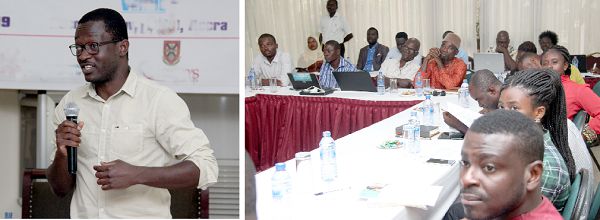
Empowerment in WASH Index launched
A research tool to assess and monitor empowerment and gender issues in relation to water, sanitation and hygiene (WASH), as well as assist in the achievement of universal and equal access to WASH services has been developed.
The novel tool, dubbed Empowerment in WASH Index, highlights the inequality in access to WASH services by directly capturing gender-based empowerment data in the WASH sector.
It was developed by researchers from the Queen’s University, Stockholm Environment Institute (SEI), Sweden, in collaboration with International Reference Centre (IRC) Ghana and the Resource Centre Network (RCN) under the Department for International Development (DfID) — funded REACH empowerment in WASH project.
REACH is a global research seven-year programme (2015-2022) led by the Oxford University with international consortium of partners and funding from the UK government with an aim to improve water security for the poor by delivering world-class science that transforms policy and practice.
The empowerment in WASH index which is being implemented in Africa and Asia has so far been piloted in the Asutifi North District in Ghana and Bukrora in Burkina Faso.
To discuss the findings from the case study applications of the index in the Asutifi North District, stakeholders in the WASH sector yesterday met in Accra during the National Level Learning Alliance Platform (NALLAP).
The NALLAP is organised by the RCN in collaboration with the Ministry of Sanitation and Water Resources and IRC Ghana.
Findings
The lead researcher of the project, who is also an assistant professor at the School of Kinesiology and Health Studies at the Queen’s University, Mr Elijah Bisung shared findings that stood out from the Asutifi North District Empowerment in WASH Index pilot project.
He said although women were responsible for collecting and managing water, it was found that women were less empowered in WASH compared to men.
Women, he said had less influence in decision making processes around household expenditure for water and also made less inputs in decisions about water management and community WASH activities.
There were also less women in leadership in WASH planning and implementation of WASH plans at the community level.
“Excluding women in decision making about community WASH activities was the largest contributor to women’s dis-empowerment in the Asutifi North District”, he said.
Women were also found to spend more time in collecting water for household use, managing water use and maintaining of toilet or hygiene facilities at the household level.
In the case of men, he said, social and cultural norms that dictated roles for men and women, particularly those that place WASH responsibilities on women accounted for men’s dis-empowerment in decisions about WASH roles and responsibilities.
That, he said, could have negative implications for the entire household.
Living no one behind
A Research Fellow of SEI, Dr Sarah Dickin said until the development of the empowerment in WASH index,there was no tool to measure who was being left behind in terms of access to WASH services.
The Sustainable Development Goal (SDGs), she said focused on universal access to WASH for all by 2030 but some interventions might have left out some marginalised groups such as women, girls, person’s living with disability.
A Water Expert with IRC Ghana, Mr Jermiah Atengdem said the index would help develop effective policies and interventions as such interventions and policies would take into consideration the variations in society.